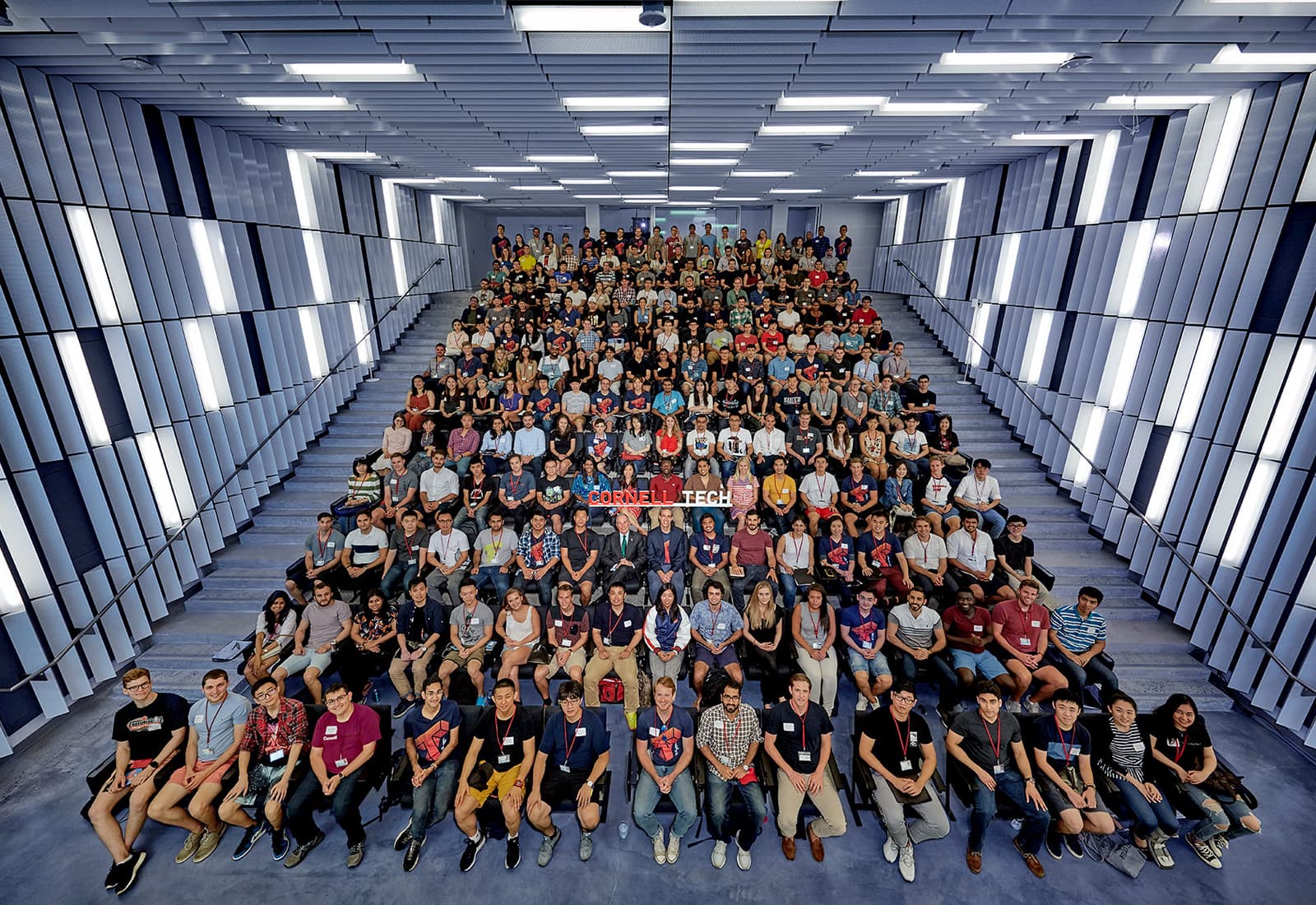Cornell Tech and the Bloomberg Center
Cornell Tech is an investment in the future of New York City — a future that belongs to the generations to come, and the students here will help build it.
Mike Bloomberg
In 2011, Cornell Tech won the Applied Sciences Competition, launched by Mayor Mike Bloomberg’s administration. The project received land on Roosevelt Island and $100 million in city capital to build a $2 billion, 2 million square foot tech campus. In September 2017, Cornell Tech opened the campus’s initial phase, the first ever built for the digital age.
Realized in partnership with the Technion-Israel Institute of Technology, Cornell Tech’s New York City campus aims to foster innovation, careers, and leadership in New York and beyond. When fully completed, the campus will include two million square feet of state-of-the-art buildings and will be home to more than 2,000 graduate students and hundreds of faculty and staff.

Academic Programs and Research
Cornell Tech has already graduated more than 300 master’s and doctoral students, with most entering the New York City tech sector. Masters students across all programs – computer science, law, business, electrical engineering, operations research, connective media, and health tech – work collaboratively on projects that help them to graduate with marketable experience.
Cornell Tech’s 30-member faculty has launched cutting-edge research groups in the areas of Human-Computer Interaction and Social Computing, Security and Privacy, Artificial Intelligence, Data and Modeling, and Business, Law and Policy.
The Jacobs Technion-Cornell Institute at Cornell Tech houses the Health Tech and Connective Media programs, where students receive dual degrees from Cornell and the Technion, and the Jacobs Runway Startup Postdoc program for recent tech PhDs.
The Runway program has been responsible for about half of the more than 30 companies that have spun out of the Cornell Tech campus with more than $20 million in funds raised and more than 100 people employed.
The Campus and the Emma and Georgina Bloomberg Center
Cornell Tech’s mission of innovation is reflected in the design of its Roosevelt Island campus. The master plan was designed by Skidmore, Owings & Merrill and incorporates a number of original features across a spectacular river-to-river campus with some of the world’s most environmentally-friendly buildings, including:
The Emma and Georgina Center, the campus’ first academic building, was dedicated in honor of Emma and Georgina in September 2017. Designed by Thom Mayne, it is a 160,000-square-foot hub for research and teaching with open meeting spaces for both students and faculty. The building dedicates 1% of its overall budget to art and features five installations. With all the building’s power generated on campus, it aims to be the largest Net Zero Energy building in the U.S. It includes a rooftop solar panel system and geothermal heating and cooling systems and is currently seeking LEED platinum certification.
The Tata Innovation Center, designed by Weiss/Manfredi, houses academic teams conducting groundbreaking research and students working to commercialize start-ups with established companies in cutting-edge technologies and products. The center was developed in partnership with Forest City Ratner Companies. It is built to LEED Silver sustainability standards and hosts art exhibitions and permanent installations.
The House, designed by Handel Architects, a 270-foot-tall residence for faculty, staff, and students, is the world’s first residential Passive House (the most rigorous energy efficiency standard in the world). It is projected to save 882 tons of CO2 per year – equal to planting 5,300 new trees.
In addition, two buildings are in their final stages but have yet to officially open:
The Verizon Executive Education Center, designed by Snøhetta, will be a venue to host the tech community for conferences, executive programs, and academic workshops, and the Graduate Roosevelt Island Hotel, designed by Snøhetta and built in partnership with AJ Capital Partners, will be a 224-room hotel to host visiting academics, conference attendees, the families of students, and other guests.
Throughout the campus, interconnected outdoor and indoor spaces facilitate easy movement, while comprehensive resilient design, including a geothermal field that provides energy to The Bloomberg Center, contributes to the building’s efficiency.
Educational Initiatives
Fulfilling its promise to New York City to spur K-12 tech education, the campus has partnered with more than a dozen local schools to coordinate professional development opportunities for teachers. In partnership with CUNY, Cornell Tech’s Women in
Technology and Entrepreneurship in New York (WiTNY) program supports girls and women entering the industry. To date, the curriculum has been implemented at more than a dozen CUNY campuses.
Integrating Art
Art is an integral component of the campus. Three restored 50-foot WPA-era murals from the Goldwater Memorial Hospital that occupied the site previously coexist with original site-specific commissions at The Emma and Georgina Bloomberg Center, chosen and curated by Bloomberg Philanthropies. Contemporary art is integrated into functional rooms, bringing inspiration to everyone on campus.
Works by Michael Riedel and Matthew Ritchie define the character of the expansive, ground floor public cafe (Riedel) and the glass-enclosed atrium at the building’s entry (Ritchie). In contrast, the remaining three works are self-contained; Matthew Day Jackson and Alison Elizabeth Taylor each created rooms that add to the adventurous spirit of the building.
In his work “Ordinary Objects of Extraordinary Beauty,” for example, Matthew Day Jackson transforms one of the building’s meeting spaces into a cabinet of curiosities by installing dozens of objects so that they appear to float above four rows of metal shelves, reflecting on the physical world beyond the institution.
Top photo: Cornell Tech’s hub for learning, the Bloomberg Center, named in honor of Emma and Georgina Bloomberg, brings students and faculty together to collaborate across disciplines on New York City’s Roosevelt Island.